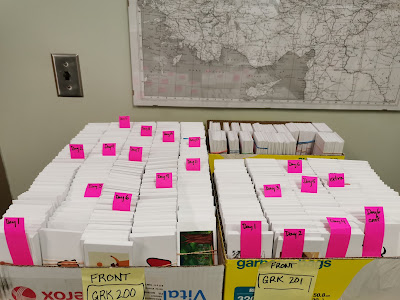When Paul pauses to catch his breath at the beginning of Romans 5, he exclaims, “we boast in the hope of the glory of God,” and then quickly adds, “What’s more, we also boast in our sufferings.” As a follower of the crucified Messiah, Paul can’t bring himself to boast directly in the hope of glory, so he backs up and starts over, tracing a sequence that leads from suffering to hope:
Suffering produces endurance,
endurance produces character,
and character produces hope.
Suffering does not always produce hope, of course; it often ends in despair. But, Paul says, for us it leads to hope. These are assertions, not arguments, no doubt based on Paul’s own experience: Those who cry “Abba Father,” co-heirs with the crucified Messiah, find that suffering leads to hope, not despair, that all creation’s groaning goes hand-in-hand, somehow, with the love of God poured into our hearts.
It is a remarkable thing when you see this truth confirmed before your eyes.
My sister, Karen, was diagnosed with ALS not quite a year ago, on Jan 6 2023, just a few days before her 54th birthday. She died on Wednesday, 29 November, leaving behind her husband of 27 years, and two young adult children.As the terrible disease took its terrible toll - the rapid loss of mobility, the loss of speech, the loss of the ability to eat - my sister lived life and faced death with courage and steadfast trust in the goodness and love of God.
A few months after her diagnosis Karen began chronicling her experience and expressing her faith on a blog she called “Sufficient Grace.”
The entry for April 11 is a typical example that sandwiches the unvarnished reality of her suffering between a Bible verse and a confession of faith:
“For his anger endureth but a moment; in his favour is life: weeping may endure for a night, but joy cometh in the morning. (Psalm 30:5)
“Grief is the companion of ALS. It rises with every loss, sometimes with great tears and sobs, sometimes with just a lingering sadness and a sense that what used to be is no more. … Joy cometh in the morning! While I am still here, there are plenty of reasons to get up in the morning–sunrises, singing birds, laughter as my husband or daughter gets me dressed, the warm smile of each of my family members, a cup of sweet hot tea, and friends. And there are many more things I could list. God’s blessings are indeed rich and infinite!”
May 6: “The Rock that is Higher than I” (from Psalm 61:2)
“It’s been a grieving week. As my hands weaken and I can hardly carry my phone, let alone lift anything else, and my legs weaken, and I struggle with the stairs, and my voice weakens, and I struggle to speak, it is so easy to get discouraged. I have become nearly completely dependent on my family. The tears of sadness and frustration have been very near the surface. But there have been good things too. With every loss, there are blessings and mercy….”
“ALS is a thief. It takes and takes, and takes some more. But it can’t take my faith, and it can’t take the promises of God.”
“I think I have more questions than answers about why God allows such difficult situations to happen to us. All I know is that He is not done writing my story just like I am not done writing my own story.”
“One of the recent losses has been that of intelligible speech. … The hardest loss has been the loss of the ability to swallow food. I really miss my morning tea and the ability to take on active part in meals with family. In my family food has been a way of showing love. We cook favorite meals because we love. This subject has taken me a while to write about because the loss has been so painful. Yes you can blend foods and push them through a tube but it isn’t the same. As these losses grow bigger the thought of heaven grows sweeter and I am reminded of Paul when he says, in Philippians 3 ... ‘I count all things but loss for the excellency of the knowledge of Christ Jesus my Lord....’”
“I am faint and weary, weary of this body that no longer works. But I look forward with hope to the One who never is faint or weak or weary. And I look forward to one day having a new body that has strength to be able to walk and talk.”
Karen’s last post, a reflection on Jesus as the bread of life - “he that cometh to me shall never hunger” - was published on Oct 21.
The blog’s final post is her obituary. You can read it here.


























.jpg/800px-Enoch_106.8-18%3B_Melito's_Homily_1-4_(CBL_BP_XII%2C_f.13v).jpg)

